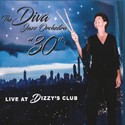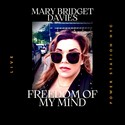|
Let's check out some live recordings. As expected, the numbers collected are not all "new" to the performers or their followers. Fan favorite/surefire pieces reappear, possibly even presented as a career retrospective. With songs and anecdotes, such is the case with Lucie Arnaz revisiting her musical theatre roles. Marking their many years together, The DIVA Jazz Orchestra mines material from across their discography, going back to their debut disc of 1995. That's also the year Allan Harris made his CD debut and his live set reaches back to it for a number, among other redux doings. Mary Bridget Davies returns to the blues of Janis Joplin on her live set, the other half of which is a musical take on Virginia Woolf.
 LUCIE ARNAZ LUCIE ARNAZ
LIVE AT THE PURPLE ROOM
CD | Digital
Some entertainers are at their best when performing in front of an audience. Ideally, listening to the live recording of a nightclub act will: make you feel like you were in the room where it happened; capture the energy exchange therein; and catch some spontaneity. If there's any included between-songs talk, we hope it will reveal the personality not otherwise glimpsed in the musical portions. Lucie Arnaz sings her way through stage career highlights with charisma and has plenty of personality in her patter–and plenty of patter, period. Stories are sometimes longer than the songs. Her act is called I Got the Job!: Songs from My Musical Past and was recorded Live at The Purple Room in Palm Springs, California.
Energetic and engaging, this is a festive feast of delights with tastes of 11 musical theatre scores. Bubbly or belting with bonhomie, likeable Lucie Arnaz delivers the goods in good form. Miss Arnaz is nightclub-savvy in connecting with a listener in the way she parses and points up individual words in a lyric. She sometimes isolates a word by semi-speaking it, surrounding it with the tiniest pauses, creating knowing emphasis and coloration, without losing the thread. Her tone and timbre are distinctive as extensions of her persona and speaking voice.
In most cases, she's singing as the character, breezily jumping from one role on her résumé to the next, such as the female lead in the original Broadway production of They're Playing Our Song and the tour of Seesaw, donning and doffing the emotional "costumes" of each with seeming ease. The musical accompaniment (piano only) typically honors the framework of the theatre origins. "Out of My Dreams" from Oklahoma! is an exception, reshaped by taking multiple liberties, with varying success.
The score of Annie Get Your Gun is the most represented; only the comedic "You Can't Get a Man with a Gun" is done with the regional accent, as opposed to the more generalized approach for an affecting, involved "I Got Lost in His Arms" (which was also on her debut album in 1993), and the whole shebang opens and closes with "There's No Business Like Show Business," replete with affection for her chosen trade.
When it comes to The Witches of Eastwick, rather than trot out anything she sang in that musical that debuted in London (and recorded for its cast album), she opts for a couple of items that were assigned to her co-stars ("Who's the Man?" and "Loose Ends"). A longtime colleague, the fine pianist/musical director Ron Abel is also represented as composer by "He Just Happened to Me," an appealing number from Hazel (lyric by Chuck Steffan), a musical that gave Lucie Arnaz a chance to direct.
Now, let's talk about the talk. Chatty and cheery, the veteran of venues from Broadway to outdoor theatres is down to earth and full of spunk and gratitude. Hearing her behind-the-scenes stories about roles–the ones she sought, was offered, and had a blast playing–come off like a friend talking to a friend. No solipsistic diva is she; this is someone frequently taking the time to praise the talents of those she worked with and self-deprecatingly relating occasions of going blank on her lines. There are some very interesting tales, such as the one about a proposed/hastily learned/ eventually abandoned replacement for "I Still Believe in Love" in They're Playing Our Song and she does a little bit of it. The longest of the 12 swaths of talking lasts for nine minutes, while another is almost as long, but the others range in length from about a minute to five minutes. On my player, at least, when there's a segue from song to talk, the sound on the CD sometimes changes noticeably, with more or less echo or reverb. My pet peeve here is her abundantly heard habit of reacting to recollection by exclaiming or semi-muttering "Oh my God!" (or a slight variation thereof). But there's no negativity or snark and almost all the patter is separately tracked so that one can skip over it on later listens.
The passing decades haven't managed to dim the robust sound and glowing spirit of Lucie Arnaz. It's a treat to have this musical scrapbook of her career, with some theatre gems shining via her vibrancy and good vibes.
 THE DIVA JAZZ ORCHESTRA THE DIVA JAZZ ORCHESTRA
"30": LIVE AT DIZZY'S CLUB
CD | Digital
Celebrating three decades of pow and panache, the all-female ensemble called The DIVA Jazz Orchestra has released a set from a live Manhattan engagement. Led by drummer Sherrie Maricle, the group's arrangements feature exciting ensemble playing and allow members to shine in solos. It's a dynamic sound, with five players on saxophones and a heavy brass presence, with even more musicians variously on trumpet, trombone and flugelhorn. Recorded in April of this year, vocalist Sue Giles joins the party on three tracks of "30": Live at Dizzy's Club. The repertoire is plucked mostly from numbers that have been sprinkled among the contents of their many albums. The often red-hot tempi with their spiffy twists and turns may keep those with short attention span engaged enough not to notice that seven of the ten tracks each clock in at times beyond six minutes.
While this project doesn't include anything from their 2022 release of show tunes (The DIVA Jazz Orchestra Swings Broadway), two of the high-spirited highlights here are from the same classic musical: West Side Story. One is "Something's Coming," which is an appropriate opening number for the set, as it was the title track of the group's very first CD. This live version takes off like a rocket, infused with high energy both in sections that are close to the original contours of the melody and the even more adventurous development. The other pick from the 1957 score, "I Feel Pretty," opts for drive and assertive sizzle, a feisty change of pace from its daintier and coy origins. And, speaking of origins, the DIVA Jazz Orchestra's founder, the late Stanley Kay, is saluted via the inclusion of his own fun, punchy composition called "Three Sisters and a Cousin" which spotlights the sax players.
The singing of Sue Giles is another asset, acknowledging for this retrospective the frequent collaborations of DIVA with vocalists over the years. Her treatment of "Here's to Life" (Artie Butler and Phyllis Molinary), a quiet and mellow rumination in many renditions, is an homage to the more robust manner by Marlena Shaw who performed it with them. "Every Day I Have the Blues" finds Miss Giles agreeably midway between styles of mournful and wistful acceptance of the titular permanent condition. Her big showcase is a long medley (more than 13 minutes, including spoken commentary) of several numbers associated with Ella Fitzgerald. The jazz legend's bright timbre, breezy approach, and distinctive phrasing are delightfully suggested without giving a sense of being labored or slavish. On "A-Tisket, A-Tasket," two of the band members also add pleasing additional vocals: Jami Dauber and Scheila Gonzalez.
Sherrie Maricle annotates the 30th anniversary with concise track-by-track liner notes regarding the group's history and discography. (The packaging's only oversight is not citing all the lyricists, even though some might argue that such credit is not so relevant when, in three of the four instances causing my carping, the words aren't being sung.) Champions at meeting the challenge to innovate and reinvigorate old material, a toast to celebrate the DIVA dazzlers is timely in any year–with more to come.
 ALLAN HARRIS ALLAN HARRIS
LIVE AT BLUE LLAMA JAZZ CLUB
Love Productions Records/ Live at Blue LLama Records
CD | Digital
October looks to be a good month for Allan Harris. In New York City, Cross That River, the musical about America's Black cowboys in the 1860s, has returned in a revised production at 59E59 Theaters (he heads the cast, plays guitar, penned the songs, and co-wrote the book with his wife/manager, Pat Harris), and he has a couple of jazz gigs at Mezzrow in Greenwich Village. Meanwhile, his newest recording is still riding high on the charts at JazzWeek.com, which measures radio play, after two straight weeks at #1. That release, Live at Blue LLama Jazz Club, captures the amiably earthy-voiced guy at work and in a groove in front of enthusiastic fans in January of this year at the Ann Arbor, Michigan venue. It's an entertaining listen and a fine showcase for the singer/guitarist and, with some long instrumental breaks, for his four bandmates: Arcoiris Sandoval (piano/keyboards); Marty Kenney (bass); Irwin Hall (saxophone and flute); Norman Edwards, Jr. (percussion).
Harris habitués have heard and/or seen much of what's in the song stack, exposed earlier in live shows, recordings, and the "Harlem After Dark" sessions streamed onto YouTube from his living room, weekly, during the months that nightclubs were shuttered. Although there are only ten selections, it's not a short visit with these talented folks as the melodies are explored at length, with eight of them lasting beyond the six-minute mark. This new version of "Nature Boy" now runs more than 11 minutes, and it's (still) more of a tour de force for the band, far afield in tone from the fragile mystique it had when it was introduced by Nat King Cole (whose repertoire has been the impetus of two Allan Harris collections). The bliss and beauty lavished on the classic ballad "The Very Thought of You" makes me wish there were other out-and-out romantic dreamscapes to drift through.
Vocal dexterity, control, and confidence are on display as the singer suavely navigates tricky tempi and deep dives into jazz architectures, without seeming to break a sweat or get self-aggrandizingly showy. Thus, he's precise and polished throughout the changing melodic terrain Chick Corea composed for "Spain," with the Al Jarreau lyric. All parties evidence much skill gained from frequent flyer miles in iconic jazz routes with the Miles Davis composition called "So What?" (introduced on that icon's Kind of Blue, the biggest-selling instrumental jazz album of all time), employing Eddie Jefferson's added words. And four examples of Allan Harris as songwriter are here, including one from his very first (1995) album, "Black Coffee Blues" (now more heated and more electrified), and the new tale about a hilltop café by the "Shimmering Deep Blue Sea." Whether things are shimmering, simmering or sizzling, it sounds like the audience and the artists are into the music at Blue LLama.
 MARY BRIDGET DAVIES MARY BRIDGET DAVIES
FREEDOM OF MY MIND
LOML/ TJ Armand Music LLC
Digital
Do you have a taste for the blues and bold, uncompromising musical statements? Well, performer Mary Bridget Davies might just be brewing your cup of very strong tea. Her new release, Freedom of My Mind, recorded live for a cluster of attendees at the recording studio Power Station NYC, is a no-holds-barred barrage of commanding catharsis. On the bill, evenly divided, are songs from a play with music centered on early feminist author Virginia Woolf and her famous A Room of One's Own (the show, written for Miss Davies, shares its title) as well as a continuation of the singer's association with the work of songwriter Jerry Ragovoy–all with collaborators, except "Don't Compromise Yourself." This latter group reprises several numbers she recorded previously in her role as the titular legendary blues rocker in A Night with Janis Joplin and/or her 2020 release called Stay with Me: The Reimagined Songs of Jerry Ragovoy. Much of what we hear is intense and unblinking. Accompaniment is by a four-piece band led by pianist Mark Berman, who co-wrote the music for the Woolf material with TJ Armand, credited for its lyrics inspired by Virginia Woolf's writing. (Mr. Armand is sole composer for the final track in that section, "End of All Roads"–a kind of cool-down episode–and is the album's producer.)
The assertive Woolf pronouncements, as expected, challenge societal expectations and gender roles, empowering women and championing free thinking. We might assume that the paucity of rhymes in some of these numbers is due to a desire to capture more of the sense of the source and its sensibilities. The performance and persona, though, often make me imagine that Virginia has returned to earth after somehow having been possessed by the spirit, style and sass of Joplin, and we're met with some kind of swaggering, high-octane hybrid. Right out of the starting gate, with the fierce first track, "Own," she's radiantly raw and raucous, advising and advocating for that prized solitude within four walls: "If you don't have your space/ No, you can't face a damn thing, honey/ Own a room of your own./ Now, I ain't lyin' ..."–embellished with idiosyncratic grunts, growls, howls, "ha-ha" and "hey hey hey" utterances that pop up on other tracks, too. The band really cooks! There's not much calm in the storm, but (relatively) more serene moments come for respite, though some build to crescendi of their own. "Freedom of My Mind" takes its cue from Woolf's words of determination ("Literature is open to everybody ... Lock up your libraries if you like; but there is no gate, no lock, no bolt that you can set upon the freedom of my mind"), which lead to TJ Armand's lyric which boasts resilience and priorities thusly: "You can take my body, leave me, ignore me and abandon me/ But you can't take the freedom of my mind./ I don't need to sacrifice./ I just need to keep my mind alive." With her indomitable presence and grit, Mary Bridget Davies digs into the words and music as a self-assured person standing her ground, digging in her heels defiantly.
When the program moves on to the Ragovoy repertoire, there's even more abandon. Depending on your response to a speed walk on the musical wild side, it's either a jaw-dropping or eye-rolling time. The all-stops-out, take-no-prisoners approach to material memorably pounced upon by Janis Joplin with raspy vocals is taken in a similar fashion. A little might go a long way, but it certainly works. (If it ain't "go-for-broke," don't fix it) The results chill with fearlessly naked emotion and pleading on bluesy rockers like "Piece of My Heart" and "Stay with Me." Quite striking in its refreshingly more restrained way, permitting some more reflective and more clear-throated tones, is the affecting "Getting in My Way." It proves that Mary Bridget Davis can grab us without full-throttle sturm und drang, but I must confess that her "sturm" is striking and that "drang" is a draw.
|
|